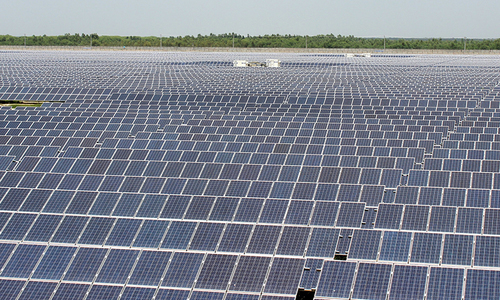ISLAMABAD: The Khyber Pakhtunkhwa government is falling behind in the implementation of the Khyber Pass Economic Corridor Project, for which the World Bank approved a loan of $460.6 million almost a year ago.
Read: WB to give $500m for solar energy, regional connectivity
A recently released report on the project states, “the project is pending effectiveness as the government’s internal approval was underway, and expected to be completed soon, hence physical activities have not commenced.”
The objective of the project is to expand economic activity between Pakistan and Afghanistan by improving regional connectivity and promoting private sector development along the Khyber Pass corridor.
Infrastructure deficiencies restrict cross-border trade between Pakistan and Afghanistan. At the border crossing, inadequate infrastructure and the need to exchange lanes creates bottlenecks that further slow cross-border traffic. Expensive informal levies assessed on the existing road by local and national agents further increase the costs of transiting the Khyber Pass.
The roadway between Peshawar and Kabul through the Khyber Pass represents a section of corridors five and six of the Central Asia Regional Economic Cooperation (CAREC) and has served as the key node in trade between South and Central Asia for hundreds of years.
Corridor five has potential to provide the shortest link between the landlocked countries of Afghanistan, Tajikistan and Uzbekistan, and the Arabian Sea while corridor six provides access to Europe, the Middle East and Russia. Improvements in transport connectivity are a key driver of regional economic cooperation among CAREC countries, World Bank says.
Despite strong demand for Pakistani products such as surgical instruments, textiles, fruits, rice, sugar, and cement and a market of nearly 70 million people, trade between Pakistan and the Central Asian Republics (CARs) is minimal, with Pakistan’s exports over the past couple of years making up less than one percent of total imports by the CARs. While trade between Afghanistan and Pakistan nearly doubled in the decade up to 2015, flows dropped by about 30 per cent over the past two years.
The ongoing development of the China-Pakistan Economic Corridor (CPEC) is designed to upgrade the infrastructure linking major cities in Pakistan to western China and the Indian Ocean. The National Highway Authority (NHA) is also developing a connectivity programme that will link Afghanistan to CPEC via border crossings at Chaman and Torkham.
The legal framework for reviving trade among Afghanistan, Pakistan, and Central Asia is in place and is developing. Pakistan’s provision of transit trade facilities to Afghanistan was first formalised under the Afghanistan Transit Trade Agreement (ATTA) signed in 1965. The agreement was enhanced in 2010, with the Afghanistan Pakistan Transit Trade Agreement (APTTA) providing reciprocal transit trade privileges to Pakistan to enter the Central Asia markets and Iran via Afghanistan.
Recently, Tajikistan has requested to be part of a trilateral transit trade agreement; a draft agreement has been prepared, to which Pakistan has consented. The Kyrgyz Republic and Turkmenistan have also indicated their interest in being part of the agreement.
Published in Dawn, April 19th, 2019














































